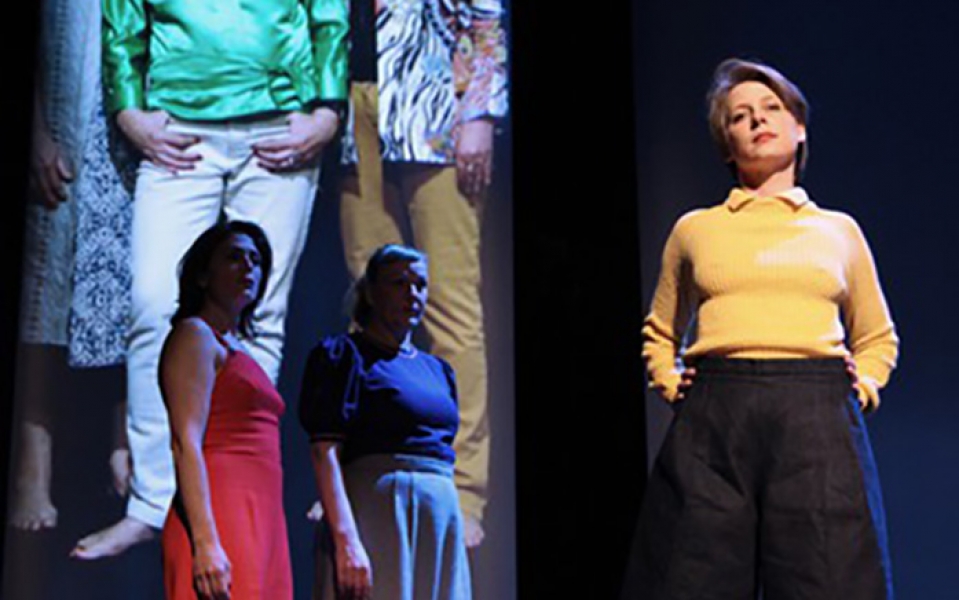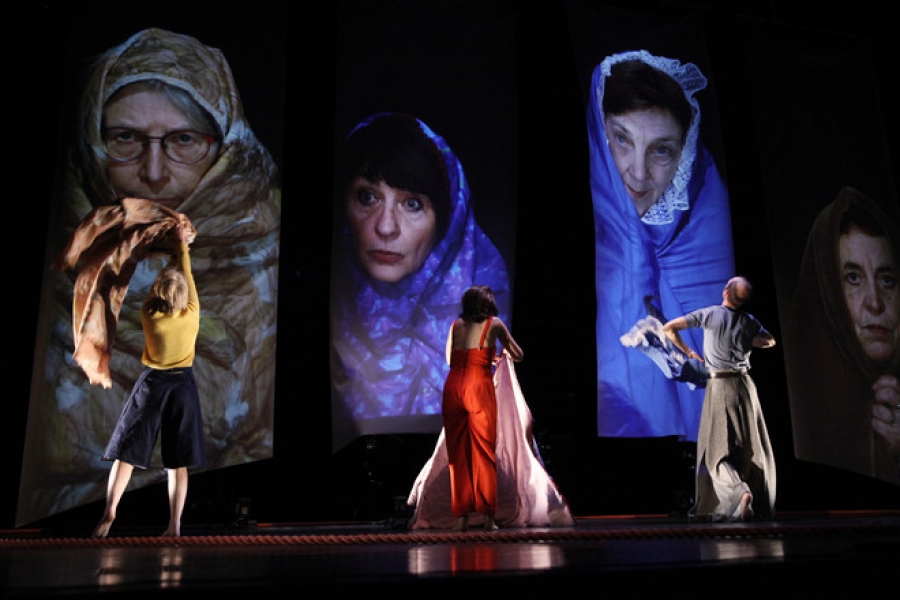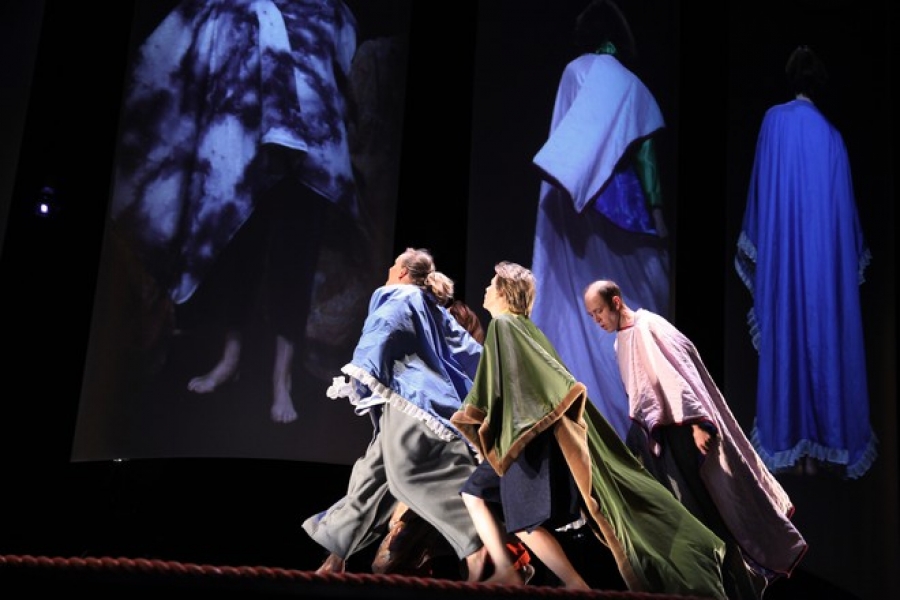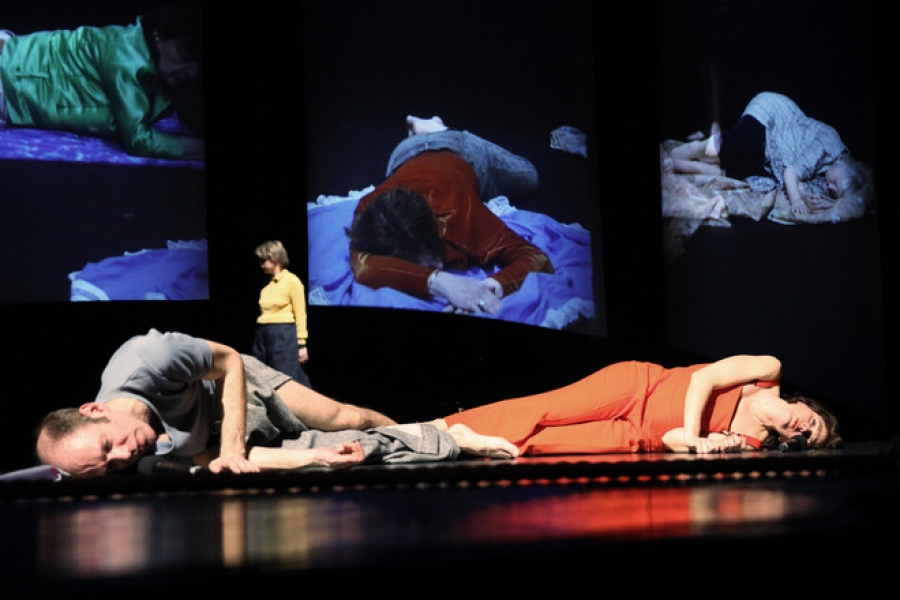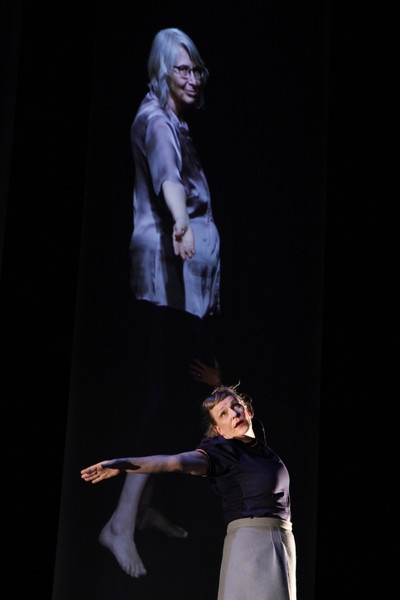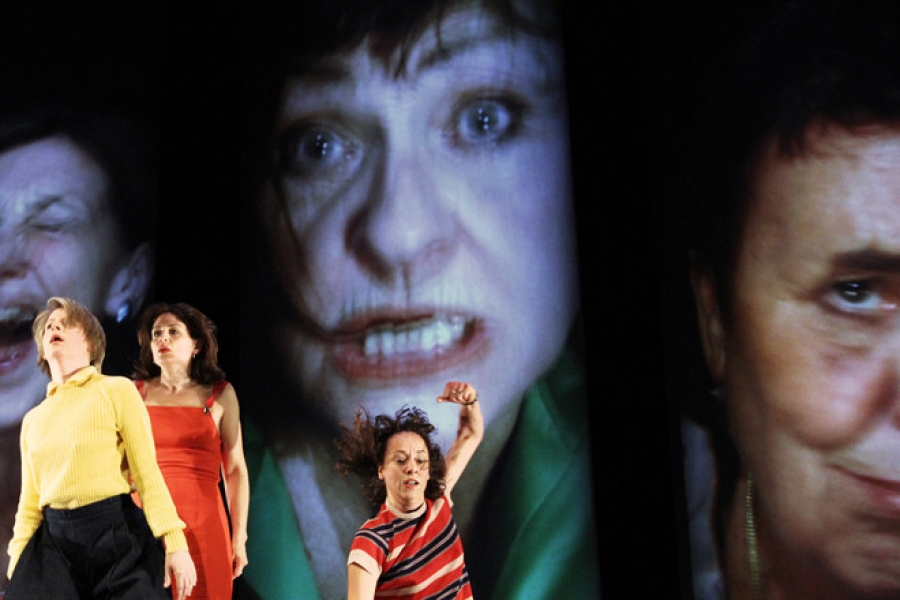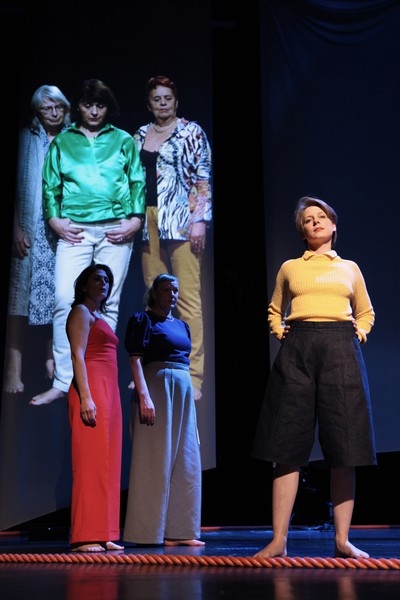The Rite of Spring
Together with their own mothers, She She Pop are staging their version of The Rite Of Spring based on Igor Stravinsky’s “Le Sacre du Printemps“. The performance focuses on the subject of female sacrifice in the family and in society. In the piece, She She Pop consciously superimpose the religious sphere of ritual human sacrifice from “Le Sacre du Printemps” with the ethical question of personal self-denial between women and men, as well as between mothers and daughters. This superimposition immediately generates reluctance: to sacrifice oneself as a woman for others is today no more than one item on an embarrassingly outdated normative agenda. The overriding importance of self-empowerment and personal freedom has placed an obscure light on all acts of sacrifice and devotion. The archaic rite of spring however stands for the certainty that every community demands sacrifices, is even only really created and confirmed by collective sacrifice.
By superimposing these two spheres, She She Pop touches on a subject that silently stands between the generations. As in Stravinsky’s original piece, The Rite Of Spring unfolds as a ritual: the encounter between She She Pop, their mothers and the audience will be staged in full ceremony. However, unlike the community assembled by Stravinsky to celebrate the spring sacrifice, She She Pop and the mothers are by no means agreed about the procedure, quite the contrary. Doubts began surfacing right at the start. But so did the resolution to attempt this together.
Credits
Concept: She She Pop. By and with: Cornelia and Sebastian Bark, Heike and Johanna Freiburg, Fanni Halmburger, Lisa Lucassen, Mieke Matzke, Irene and Ilia Papatheodorou, Heidi and Berit Stumpf, Nina Tecklenburg.
Director of Photography & Video Installation: Benjamin Krieg & She She Pop. Set: Sandra Fox & She She Pop. Costumes: Lea Søvsø. Musical Collaboration: Damian Rebgetz. Choreographic Collaboration: Jill Emerson. Dramaturical Advice: Ruschka Steininger. Light Design and Technical Direction: Sven Nichterlein. Sound: Florian Fischer. Video Assistant: Anna Zett. Surtitles: Panthea (Anna Kasten).Coordination and Support: Fanny Frohnmeyer, Kaja Jakstat, Ruschka Steininger. Technical Tour Support: Florian Fischer, Manuel Horstmann, Andreas Kröher, Michael Lentner, Sven Nichterlein, Torsten Schwarzbach. Production/PR: ehrliche arbeit – freelance office for culture. Freelance Communication Support: Tina Ebert. Financial Administration: Aminata Oelßner. Company Management: Elke Weber.
A She She Pop Production. In Co-Production with HAU Hebbel am Ufer, FFT Düsseldorf, Mousonturm Frankfurt, Kaserne Basel, brut Vienna, German Language Theater Festival of Prague/Archa Theater Prag, Kyoto Experiment and Théâtre de la Ville/Festival d’Automne à Paris.
premiere, April 2014, HAU, Berlin
Residency funded by Art Center Kyoto, Kyoto Experiment and the Goethe Institute.
Funded by the City of Berlin – Department for Cultural Affairs and the Hauptstadtkulturfonds Berlin.
Trailer
Dates
past dates:
Press
THE RITE OF SPRING as performed by She She Pop and their mothers at Short Theatre Festival 2015 Rom
From a post-feminist perspective, it may seem like a banal or even obsolete claim to say that that women are not only victims of male violence, which incidentally plays no role here, but also of their own sacrifices. From the very outset, the fact that, on the surface, She She Pop has simply staged a new, highly unusual interpretation of Igor Stravinsky’s Le Sacre Du Printemps lifts the project out of the private sphere and into the abstract. Music, even when it is as programmatic as in Stravinsky’s case, eludes the context of linguistic meaning. (…) But the fact that The Rite of Spring is not staged family therapy should not be levelled at it as a criticism. On the contrary, it expresses in a highly precise way – by equally ranking linguistic and non-verbal, technical and musical media – the multilayered female identity along the spectrum of autonomy and sacrifice (or, for those that find that too melodramatic: the renunciation of chances for personal growth). The Rite of Spring is much more than a therapeutic group session. This is fortunate, and also aesthetically pleasing.
Bettina Schulte, Badische Zeitung, 28.06.2014
Of course, there is a temptation to compare The Rite of Spring with Testament. The most noticeable difference is the more direct – and therefore more dramatically rewarding – style of Testament, a play about their fathers. But that is precisely the strength of this play about their mothers: it is at its most eloquent when things remain up in the air. When what is not going to be said is said. But without words. Women and their bodies might seem like a hackneyed subject. But dance is a form of expression from bygone times, when things were either criticised or never criticised. When Mother sabotaged every family get-together with her bad mood. When unsaid expectations hung in the air. With this play, in which the four mothers are not present on stage themselves, but are projected on screens in video recordings instead, the audience has to fill in the gaps with its own ideas. And once again, She She Pop manages to steer clear of clichés; to be radical without over-simplifying. The Rite of Spring is not a tribunal but, well, a declaration of love. At the end we are not confronted with death, as in Stravinsky’s version, but with reconciliation.
Regula Frevler, Neue Zürcher Zeitung (NZZ), 15.06.2014
There is still much talk on stage, even if much less than in Testament. The collective has put its private material through the shredder of indirect speech to conceal any exact correlations –only to wheel out all the contradictions: children averse to cuddling, mothers whose love is smothering, the childish desire for closeness, smashed doors, conversation breakdowns, competition, distance that is won and endured at great effort – and the guilty paradox that your own artistic feminist work may have been made possible by your mother sacrificing her own interests. “We don’t want to talk about the presence of these women being at least as important as their absence. Or that we want to be close without talking to them.” So the bodies gain centre stage instead: the genesis of the intensive – and tense – relationship between mother and child is, after all, the physical connection, and, in the case of mothers and daughters, identification is added into the mix. She She Pop plays visually on these childish identifications: the daughters on stage imitate the screen mothers’ improvised dances, and video portraits of the children are superimposed onto those of the mothers, merging into each other and showing astonishing resemblances. Sebastian Bark regresses to a babe in arms at his mother’s breast – a horrifying image. And the mothers join in, huddling like medicine women in their blankets and capes, sometimes miming the part of devouring monsters, without vanity and with a sense of humour. And sometimes with the strange, jerky and touching – albeit completely un-esoteric – ritual with which She She Pop celebrates Stravinsky, complete with a flashing crown with the word “Victim”, lint removers and vacuum cleaners. Utopia as a cautious meeting place for mothers and children – with as much frankness as possible, and as much distance as necessary.
Eva Behrendt, Theater Heute, June 2014
After its world premiere in Berlin, “The Rite of Spring” as performed by She She Pop and their mothers now has come to Frankfurt for no more than two completely sold-out performances at the Frankfurter Mousonturm – we can only hope that the piece will be shown there again in the near future. Not that mothers and children of all ages are presented with a pseudo-artistic systemic family constellation. No – “The Rite of Spring” may at first appear to be as much, but it was not quite as simple and easy for She She Pop, when they put their own fathers on stage in the celebrated production “Testament” four years ago: discussing love and the contracts between the generations against the backdrop of Shakespeare’s “Lear”. The group, who has been working together for 15 years, have not simply produced a cover version for their mothers, but continued their train of thought. Among other things, they reflect that it may be easier to perform with fathers, rather than discover things about mothers. Reservations, limitations and difficulties are laid bare: the fact that mothers and children often use to same words to speak about completely different things. What does it mean when a mother wishes her daughter were “emancipated”? What should a daughter think of a mother, who has been married for 45 years, but has no idea about the family finances? What does “sacrifice” mean for the mother generation, born during the war, and what do mothers and the children understand by suffering, dignity, appreciation and freedom? She She Pop have found a new, clever way to negotiate the issues of mother-child relationships and self-images. The audience faces four brightly patterned screens on which the four mothers of Sebastian Bark, Johanna Freiburg, Ilia Papatheodorou and Berit Stumpf soon appear in images and on film. Right from the start, we therefore have here mother images in a dual sense – images that both performers and spectators must deal with. And right from the beginning, She She Pop also resort to an equally dual theme. The subject of “sacrifice” by women and mothers, which plays such a major role in feminist literature, is interwoven with Stravinsky’s “Sacre du printemps”. After an initial prolog, the music is played in its full length with a few short breaks. This gives the evening its structure and is accompanied by dance, song and clapping. More often than not, the archaic stamping appears a satire of “Dance Yourself Free”, of esoteric workshops and family therapy sessions. But the deliberate rhythms and the simple steps also lend the evening a level of abstraction that allows mothers and performers much freedom.
Eva-Maria Magel, Frankfurter Allgemeine Zeitung (FAZ), 28.04.2014
Reviews of the premiere in April 2014
Dance the Mother! A great show about everything but … guilt and the mistakes that parents make. … so it’s absolutely logical and conceptually stringent that the encounter between mothers and daughters is relocated to the physical realm after the enlightening “preamble”: unlike in the case of the fathers in “Lear”, the backdrop here, with the mothers, is not a play, but a ballet composition from 1913 – with a fairly crude plot from today’s point of view. In Igor Stravinsky’s “Le Sacre du Printemps”, i.e. the “Rite of Spring”, a virgin is sacrificed to appeal the god of spring. The Chosen is forced to ritually dance herself to death. She She Pop have superimposed mundane issues of denial onto the religious story of sacrifice: who sacrifices what in a relationship between man and woman, between mother and child? Of course, right from the start the term “sacrifice” is the evening’s highly productive bone of contention, for as we all know taking a step back and relinquishing is not a very en vogue thing to do in today’s society of personal fulfillment. And although the number of sacrificial acts performed in the past seem obvious at first – three of the four mothers sacrificed their careers for their marriages and their children – over the course of this evening of small gestures and reading between the lines, the coordinates shift and reveal a higher degree of complexity: by giving something up, the mothers also of course developed their own projections onto and expectations of their children, which in turn have produced other, but similarly tough daughterly sacrifices. In the second part, She She Pop mainly turn all of this into dance– not of course into perfectly structured choreography and extended legs, but rather expression and communication – beyond the merely verbal. That this sometimes appears a bit awkward is in no way accidental, but rather – on the contrary – an integral part of this brilliant show’s agenda of honesty.A great show about everything but guilt and the mistakes that parents make.
Christine Wahl, Spiegel online, April 11, 2014
Look, Mother … A play with imagination and reflection, identification and rejection, subjugation, projection and alienation. … both generations are initially suspicious of speaking about sacrifice, about denial and devotion. Personal freedom and female self-empowerment was just as popular among the mothers in their own time. And yet nevertheless, one of them sacrificed her career in order to have a family, the other gave up her own future as an artist out of love for her husband. These biographical slivers, which include stories of emancipation and success, have nothing confessional about them. The performance by She She Pop and their mothers finds a good artistic form in which to embed the personal in a much wider, more extensive context and produce a narrative that many can identify with out of individual and smaller distinctly different stories.
Katrin Bettina Müller, taz Berlin, April 12, 2014
Mamma Mia Cornelia Bark, Heike Freiburg, Irene Papatheodorou and Heidi Stumpf, the mothers of performers Sebastian Bark, Johanna Freiburg, Ilia Papatheodorou and Berit Stumpf, are four very impressive ladies, who fortunately do not lean towards false harmony, in spite of whatever motherly love they may be feeling. Assemblages and recorded rehearsal conversations about setting boundaries, mutual expectations, staking claims, as well as about just how private this piece should be, can be heard from off-stage: “I really don’t want to tell just anyone everything.” The rehearsal process is deliberately used to bring life-long mother-child conflicts to a new level, but profits from the curious, as well as careful way that the three daughters and one son treat their mothers – while taking them much too seriously to conceal any differences. The form that She She Pop has found to do all this makes the piece seem neither contrived nor embarrassingly indiscrete, but rather enlightening. Unlike in the case of the fathers in “Testament”, the mothers are not live on stage. They appear on four large screens, from which they observe, comment on, wonder about their children’s performance and show their pleasure at their reactions. No more or less than what they have been doing since the birth of their offspring. That the children are now in charge is part of the game, which the mothers agreed to – at least for the length of the rehearsal period. The exploration of these mother-daughter and mother-son relationships structures the general issue of who sacrificed what for whom and thus also what the price of old gender roles is. Three of the four mothers gave up their careers for their husbands and children: “Now you have to decide, get married and have children. Of course, this baby didn’t initially fulfill me”, recalls Irene Papatheodorou. She and She She Pop are smart enough to also ask what price must be paid, when self-fulfillment is dictated by society: “I would like to know if there could be a society in which no one is willing to sacrifice anything.”
Peter Laudenbach, Süddeutsche Zeitung, April 14, 2014
